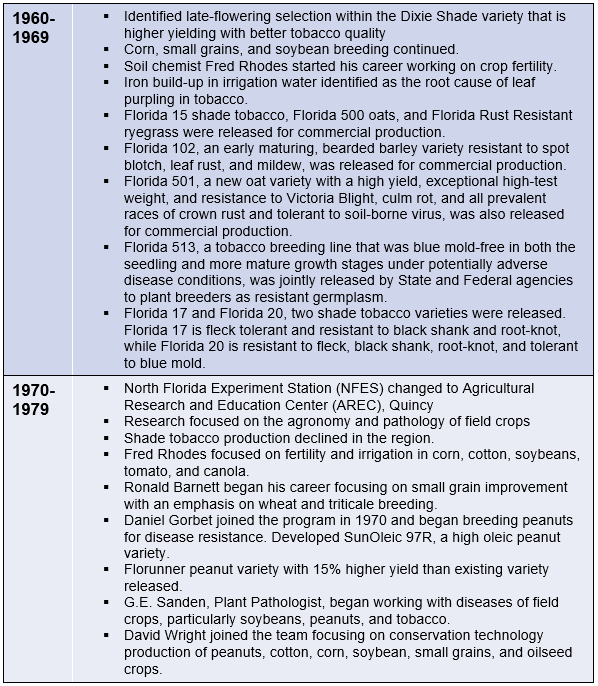Ramdeo Seepaul, Research Assistant Scientist, and Sheeja George, Agricultural Scientist, UF/IFAS North Florida Research and Education Center
From stacks of paper notes stating problems in farm fields to instant solutions delivered at the click of a button on the smartphone, communication between researchers, extension agents, and farmers has evolved greatly over time. The modes of delivery used by researchers and extension professionals at the UF/IFAS North Florida Research & Education Center (NFREC) in Quincy may have changed, but the mission remains the same. The central theme of that mission is, and has always been, to equip farmers in the Florida Panhandle to produce food and fiber sustainably and profitably. “Sustainable” may not have been part of the everyday vocabulary surrounding production agriculture back in 1921, but its basic tenants have always been evident in the work being done at the NFREC.
If the NFREC-Quincy’s role in agricultural research and extension could be described in a few words, it would be, “helping farmers adapt”. This is true now, as we celebrate 100 years of existence, and this was true when the visionaries came together to make the center a reality. Scientists at the Quincy REC have always stayed ahead of the curve to bring the latest science to the farmer. The agronomy and plant pathology disciplines have always paired up at the Quincy REC to provide well-rounded answers to new challenges in the field. While there are many impactful outcomes from this collaboration, some deserve special mention. Cotton hard lock, soybean rust, sod-based rotation, and the advances made in managing tomato spotted wilt virus, to name a few from more recent history. The station got its start to developed science based disease solutions to the shade tobacco industry, but has been evolving ever since to serve the local agricultural industry across North Florida.
–
Multi-disciplinary, systems-level research well integrated with Extension is at the core of NFREC. This is evidenced by the approach taken at the Quincy REC with agronomists and plant pathologists seeking out the soil scientist, nematologist, entomologist, or animal scientist to help fully understand the complex spectrum of factors that affect crucial issues like crop performance, disease management, integrated crop-livestock systems, or building soil health without breaking the bank. They don’t need to go too far to seek this expertise out. The experts are right across the hallway or in the office next door. That is the charm of scientific discovery at the Quincy NREC. Combine with this atmosphere, the power of extension, the infrastructure to support long-term systems-level research afforded by the land-grant mission, the laboratories, field equipment, facilities and resources at the NREC, and we have all the right ingredients for success and meaningful impact to agriculture, not just in the Panhandle but across the globe.
This group partners with farmers in the region and other agencies like the FDACS, DEP, NW FL Water Management district, and other state, federal and private agencies to devise workable solutions. Solutions to help farmers lead the way in responding to society’s challenges both today and in the future; to feed the growing population; to grow more with less; all while protecting our air, soil, and water.
–
-
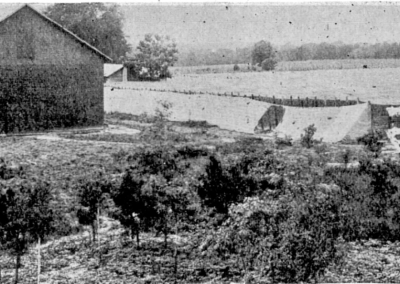
Tobacco barn and shade facility at the Tobacco Experiment Station, Quincy (circa 1923). Source: University of Florida, Agricultural Experiment Station, Report For The Fiscal Year Ending June 30, 1923.
-
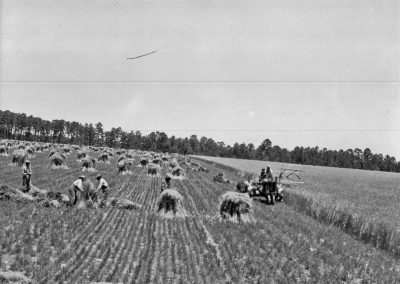
Harvesting oat variety Hastings 100-bushel at the North Florida Experiment Station, Quincy, FL (circa 1938). Source: NFREC Archives
-
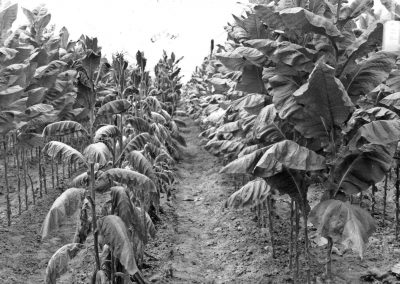
Testing tobacco varieties for resistance to black shank at at the North Florida Experiment Station, Quincy, FL (circa 1943). Source: NFREC Archives.
-
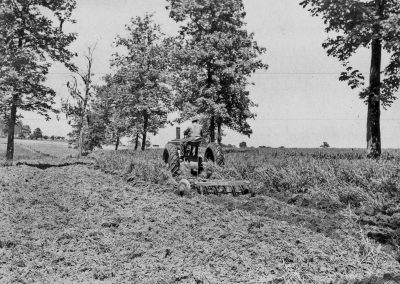
Disking lupine to add nitrogen and organic matter prior to planting Coastal Bermudgrass at the North Florida Experiment Station, Quincy, FL (circa 1944). Source: NFREC Archives
-
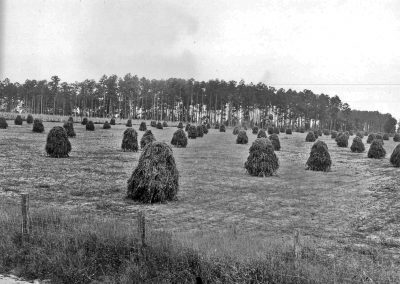
Soybean grown for hay at the North Florida Experiment Station, Quincy, FL (circa 1935). Source: NFREC Archives
-
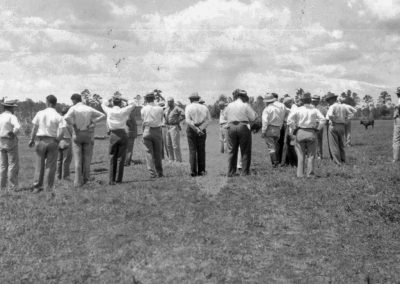
Forage Field Day at the North Florida Experiment Station, Quincy, FL (circa 1948). Source: NFREC Archives
-
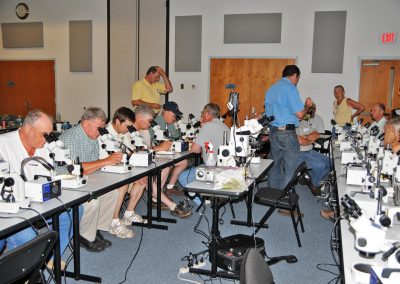
Participants get hands-on experience identifying soybean rust during the 2009 Soybean Rust Workshop at North Florida Research and Education Center, Quincy, FL (August, 2009). The workshop drew 103 participants from the 12 north central states, as well as several other soybean producing states across the United States. Source: David Wright, UF/IFAS
-
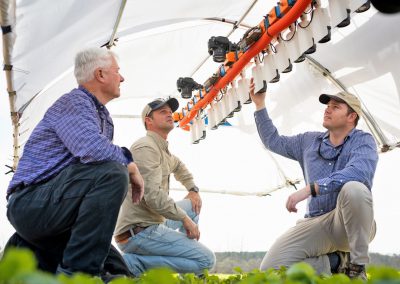
David Wright (left), Derek Hurley (middle), and Ian Small (right) examine the sensor mechanism attached to the multi-purpose Phenogator vehicle that uses sensors in combination with highly accurate GPS technology. This system was developed at the North Florida Research and Education Center in Quincy, FL (January 2020). Source: UF/IFAS File Photo
Acknowledgements: The authors wish to thank Drs. David Wright and Jim Marois for sharing their memories and several anecdotes with us which made this article possible
References: 100 years of NFREC Annual Reports


